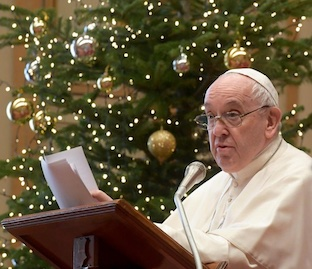Pope urges Curia to embrace humility

Image: Vatican Media
Source: Vatican News
Pope Francis exchanged Christmas greetings with members of the Roman Curia, yesterday, and urged them to embrace humility like the Child Jesus in order to leave space for creativity, build communion, and keep the Church's mission focused on Christ.
Taking the Biblical account of Naaman the Syrian, a military general and leper who sought healing from the prophet Elisha (2 Kgs 5), as an example for a person who covered their disease with bravery and honours, he said: "We often find this contradiction in our lives: sometimes great gifts are the armour that covers great frailties."
The Pope said there comes a time in every person's life when we must set aside the "world's glory for the fullness of an authentic life."
When Elisha offered Naaman a simple solution to his problem - stripping off his armour and bathing in the River Jordan - the general hesitates at first, before relenting and descending in humility to find healing.
"Once we strip ourselves of our robes, prerogatives, positions and titles, all of us are lepers in need of healing. Christmas is the living reminder of this realization."
Pope Francis then warned against the temptation of "spiritual worldliness" which sets aside humility in favour of "our role, the liturgy, doctrine, and religious devotion." This leads to vainglory where we dream of glorious undertakings yet spend no time on service or our true mission.
Humility, on the other hand, means "inhabiting" our humanity with "realism, joy, and hope", while looking on our poverty with the love and tenderness of Jesus.
Pride, as the opposite of humility, burns both our link to the past and our growth in the present and future, leaving us only as barren trunks who neither remember nor are able to give life.
"The humble are those who are concerned not simply with the past, but also with the future, since they know how to look ahead, to spread their branches, remembering the past with gratitude. The humble give life, attract others and push onwards towards the unknown that lies ahead."
The Pope went on to note that everyone is called to humility, in the footsteps of Jesus, so as to encounter God, find salvation, and embrace our brothers and sisters.
He recalled the opening of the synodal journey in October, calling the Roman Curia to embrace the conversion toward the "style of synodality" and lead the Church as a witness. Poverty and simplicity of lifestyle, he said, are concrete ways the Curia can lead along the path of humility.
Pope Francis recalled his opening speech of the Synod and the three ways he offered to concretise humility.
"Participation" expressed through co-responsibility, he said, leaves space for creativity to emerge within various Vatican offices. "Authority becomes service when it shares, involves and helps people to grow."
"Communion" allows us to put Christ back in the centre, encourages healthy working environments, and overcomes the urge to create factions and climb the corporate ladder. "An attitude of service requires, and indeed demands, a good and generous heart, in order to recognize and experience with joy the manifold richness present in the People of God."
"Mission" opens our hearts to embrace Jesus' "passion for the poor" and those who languish in material or spiritual need. "The Church also reaches out to the poor because we need them: we need their voice, their presence, their questions and criticisms."
Pope Francis concluded his address expressing his hopes that the Roman Curia might embrace the "humility of Christmas and the manger, by the poverty and simplicity with which the Son of God entered into the world."
As Jesus descended-both in his birth and in his washing of the disciples' feet at the Last Supper-so are members of the Curia called to recall their own leprosy and need for healing and humility.
"This is the lesson of Christmas: humility is the great condition for faith, for the spiritual life and for holiness. May the Lord grant it to us as a gift, starting with the primordial sign of the Spirit's presence within us: desire. What we lack, we can at least begin to desire."
Read the Vatican translation of Pope Francis' address: https://press.vatican.va/content/salastampa/it/bollettino/pubblico/2021/12/23/0875/01848.html

















